238643
IGEPAL® CO-520
average Mn 441
Synonym(s):
Polyoxyethylene (5) nonylphenylether, branched
Sign Into View Organizational & Contract Pricing
All Photos(1)
About This Item
Linear Formula:
(C2H4O)n · C15H24O, n~5
CAS Number:
MDL number:
UNSPSC Code:
12162002
PubChem Substance ID:
NACRES:
NA.23
Recommended Products
mol wt
average Mn 441
refractive index
n20/D 1.496 (lit.)
density
0.997 g/mL at 25 °C (lit.)
HLB
10
SMILES string
CCCCCCCCCc1ccc(O)cc1.OCCOCCOCCOCCOCCOCCOCCOCCOCCOCCOCCOCCO
General description
IGEPAL®CO-520 or poly (oxyethylene)nonylphenyl ether) is a non-ionic surfactant.
Application
Igepal aggregates have been used in fluorescence and light-scattering studies.Used in the preparation of monodispersed colloidal silica cadmium suphide nanocomposites, alumina nanoparticles, ultra thin silica coated magnetic nanoparticles.
Legal Information
IGEPAL is a registered trademark of Solvay
Signal Word
Warning
Hazard Statements
Precautionary Statements
Hazard Classifications
Aquatic Acute 1 - Aquatic Chronic 1
Storage Class Code
10 - Combustible liquids
WGK
WGK 3
Flash Point(F)
380.3 °F - closed cup
Flash Point(C)
193.5 °C - closed cup
Certificates of Analysis (COA)
Search for Certificates of Analysis (COA) by entering the products Lot/Batch Number. Lot and Batch Numbers can be found on a product’s label following the words ‘Lot’ or ‘Batch’.
Already Own This Product?
Find documentation for the products that you have recently purchased in the Document Library.
Customers Also Viewed
Synthesis and characterization of alumina nanoparticles by igepal CO-520 stabilized reverse micelle and sol-gel processing
Chandradass J and Bae DS
Materials and Manufacturing Processes, 23(5), 494-498 (2008)
Aggregation of non ionic surfactant Igepal in aqueous solution: fluorescence and light scattering studies
Ghosh SK, et al.
International Journal of Molecular Sciences, 4, 562-571 (2003)
Preparation and properties of tailored morphology, monodisperse colloidal silica-cadmium sulfide nanocomposites.
Chang SY, et al.
Journal of the American Chemical Society, 116(15), 6739-6744 (1994)
Ming Zhang et al.
Nanotechnology, 19(8), 085601-085601 (2008-02-27)
A systematic study of the formation of silica-coated magnetite particles via a modified reverse microemulsion approach was investigated by using transmission electron microscopy (TEM), x-ray diffraction (XRD) and a superconducting quantum interference device (SQUID). The results show that the surfactant
Mirko Trilling et al.
Journal of virology, 83(8), 3684-3695 (2009-02-13)
Vaccinia virus (VACV) replicates in mouse and human fibroblasts with comparable kinetics and efficiency, yielding similar titers of infectious progeny. Here we demonstrate that gamma interferon (IFN-gamma) but not IFN-alpha or IFN-beta pretreatment of mouse fibroblasts prior to VACV infection
Our team of scientists has experience in all areas of research including Life Science, Material Science, Chemical Synthesis, Chromatography, Analytical and many others.
Contact Technical Service








